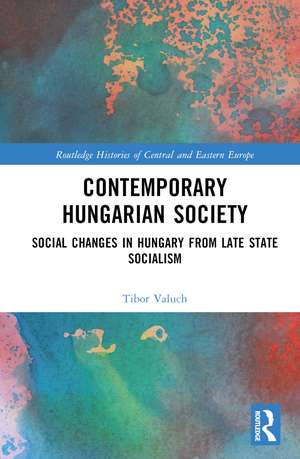Contemporary Hungarian Society: Social Changes in Hungary from Late State Socialism: Routledge Histories of Central and Eastern Europe
Autor Tibor Valuchen Limba Engleză Hardback – 26 aug 2024
The Hungarian regime change of 1989–1990 led to previously unimaginable social and economic transition. In recent decades, regime change and socioeconomic transition in Central and Eastern Europe have produced a library of literature, and transition studies has periodically become a discipline in its own right. The author uses an interdisciplinary approach – drawing from social history, sociology, statistics, and contemporary history – in order to understand and analyse social change in all its complexity.
The book will be of interest to undergraduate and postgraduate students, social scientists, historians, experts, and those interested in Hungarian and Central and Eastern European history and social change.
Din seria Routledge Histories of Central and Eastern Europe
-
 Preț: 311.41 lei
Preț: 311.41 lei -
 Preț: 311.90 lei
Preț: 311.90 lei - 8%
 Preț: 382.96 lei
Preț: 382.96 lei -
 Preț: 310.55 lei
Preț: 310.55 lei - 9%
 Preț: 868.47 lei
Preț: 868.47 lei -
 Preț: 311.48 lei
Preț: 311.48 lei -
 Preț: 310.22 lei
Preț: 310.22 lei -
 Preț: 310.84 lei
Preț: 310.84 lei -
 Preț: 310.99 lei
Preț: 310.99 lei -
 Preț: 389.66 lei
Preț: 389.66 lei -
 Preț: 310.22 lei
Preț: 310.22 lei -
 Preț: 310.84 lei
Preț: 310.84 lei -
 Preț: 163.04 lei
Preț: 163.04 lei - 18%
 Preț: 1000.27 lei
Preț: 1000.27 lei -
 Preț: 309.79 lei
Preț: 309.79 lei - 18%
 Preț: 1000.27 lei
Preț: 1000.27 lei - 16%
 Preț: 264.98 lei
Preț: 264.98 lei - 18%
 Preț: 1006.77 lei
Preț: 1006.77 lei -
 Preț: 385.47 lei
Preț: 385.47 lei - 18%
 Preț: 1001.39 lei
Preț: 1001.39 lei - 18%
 Preț: 1000.27 lei
Preț: 1000.27 lei - 18%
 Preț: 887.43 lei
Preț: 887.43 lei -
 Preț: 387.49 lei
Preț: 387.49 lei - 18%
 Preț: 1002.02 lei
Preț: 1002.02 lei -
 Preț: 389.66 lei
Preț: 389.66 lei - 18%
 Preț: 1006.43 lei
Preț: 1006.43 lei - 18%
 Preț: 1109.18 lei
Preț: 1109.18 lei - 19%
 Preț: 269.84 lei
Preț: 269.84 lei -
 Preț: 311.41 lei
Preț: 311.41 lei - 18%
 Preț: 1003.30 lei
Preț: 1003.30 lei - 18%
 Preț: 1000.27 lei
Preț: 1000.27 lei - 18%
 Preț: 1006.77 lei
Preț: 1006.77 lei - 17%
 Preț: 259.72 lei
Preț: 259.72 lei -
 Preț: 390.84 lei
Preț: 390.84 lei
Preț: 1007.72 lei
Preț vechi: 1228.92 lei
-18% Nou
Puncte Express: 1512
Preț estimativ în valută:
192.85€ • 200.60$ • 159.21£
192.85€ • 200.60$ • 159.21£
Carte tipărită la comandă
Livrare economică 15-29 aprilie
Preluare comenzi: 021 569.72.76
Specificații
ISBN-13: 9781032351636
ISBN-10: 1032351632
Pagini: 350
Ilustrații: 50
Dimensiuni: 156 x 234 mm
Greutate: 0.67 kg
Ediția:1
Editura: Taylor & Francis
Colecția Routledge
Seria Routledge Histories of Central and Eastern Europe
Locul publicării:Oxford, United Kingdom
ISBN-10: 1032351632
Pagini: 350
Ilustrații: 50
Dimensiuni: 156 x 234 mm
Greutate: 0.67 kg
Ediția:1
Editura: Taylor & Francis
Colecția Routledge
Seria Routledge Histories of Central and Eastern Europe
Locul publicării:Oxford, United Kingdom
Public țintă
PostgraduateCuprins
1. Introduction 2. Approaches to the regime change, post-communism and illiberalism: Concepts and interpretations 3. Demographic change shifts in Hungarian society, 1980–2021 4. The spatial distribution of Hungarian society 5. Minority groups and ethnicities, from within and beyond the borders of Hungary 6. Social stratification: Mobility and social structure during the post-communist transition and in the illiberal system 7. Old, new and reviving social groups, from the post-communist transition to the illiberal system 8. Society and politics during the post-communist transition, the early twenty-first century, and under illiberalism 9. Collective opinion and values 10. Social relations and situations 11. Unique aspects of the transformation of Hungarian society between 1980 and 2020: From the perspective of a Central and Eastern European comparison
Notă biografică
Tibor Valuch is a social historian and research professor at the Center for Social Sciences, Institute of Political Science, Budapest. He is also a professor at the Institute of History, Eszterházy Károly Catholic University in Eger. His main research fields include the contemporary Hungarian and (Central) European social and cultural history, history of everyday life, and labor history. His latest publication is: Everyday life under Communism and after –Consumption an Lifestyle in Hungary, 1945–2000 (2021).
Descriere
This book examines social change in Hungary, commencing with the period of late-stage socialism, the country’s immediate post-communist transition, its subsequent consolidation and the emergence of authoritarian leadership since 2010.
